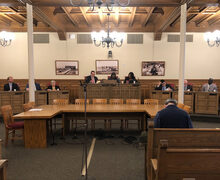As a Latine voice at The D.O., BIPOCs in the media are too rare
Maxine Brackbill | Photo Editor
Discrimination against the Latine community is a result of a lack of representation in the newsroom, argues our columnist Valeria Martinez. We should challenge the lack of diversity by centering more Latine stories in the media.
Get the latest Syracuse news delivered right to your inbox.
Subscribe to our newsletter here.
I never thought I’d end up storytelling – I never even considered myself someone who had a story to tell growing up. But moving 2,000 miles away from my 97% Latine town of Laredo, Texas, opened my eyes to the injustices we face in – strategic – blissful ignorance as our education is indoctrinated by white nationalist state leaders whose maintenance of wealth depends on our work, resources and land – with only our health at stake.
Had it not been for an editor at The Daily Orange reaching out to me about becoming a columnist, I would’ve stayed in research and gotten published maybe once or twice in my four years here. As a triple major taking 19-credit semesters, I don’t have a lot of time to spare, and as a first-generation college student I didn’t know that contributing to a college newspaper was something I’d have the time to do on top of everything else.
Rather than highlight the myriad of opportunities students have to tell and echo stories on an amplified platform, these publications tend to gatekeep knowledge from the communities that need it most. We deserve access to these platforms that will undoubtedly reach a wider audience than that of academia.
To be more than lab rats or tokens we must be allowed and encouraged to use our voices and assets, such as The D.O., to speak out on societal unconformity; disaffiliation with the inferior connotation of storytelling is the first step.
The lack of Latine representation within academic and journalistic spheres reveals a pervasive undercurrent of marginalization and erasure. It’s not that we have nothing to say – it’s that as people of color, especially Black, Indigenous and Latina women, we’ve been subjected to structural systems that make economic stability less and less possible, and ultimately make storytelling unfeasible for economic stability.

Cole Ross | Digital Design Editor
This marginalization is deeply intertwined with the neocolonialist framework that underpins our education and, mainly, our economic systems, perpetuating systems of inherent inequity. Storytelling is a fundamental aspect of cultural expression and identity — yet it is often pushed to the sidelines in academia because it’s deemed less serious or valuable than other sources of knowledge production, such as those that align with individualistic Western values.
The consequences can be reflected by the lack of input in The Daily Orange’s LatinX section, in which I’ll be marked as the second collaborative voice; more Latine columnists have gone through the revolving doors of The Daily Orange, but an editorial staff that reflects our predominantly white institution’s demographics has been negligent to represent the 10% of Latine students on campus.
A lack of diverse perspectives and narratives that reflect the richness and complexity of Latine’s experiences in The D.O. – a Syracuse University relic – continues the complicit legacy of undermining the value of the stories that my peers of color have to tell.
Further, as we work to understand the root causes of this marginalization, it is crucial to examine the intersectionality of identity within storytelling. Latine individuals, like other marginalized communities, face intersecting forms of discrimination based on race, ethnicity, gender and socioeconomic status, all of which shape the narratives they bring forth.
The dominance of Eurocentric perspectives reinforces stereotypes and erases the experiences of Latine communities, but it also perpetuates systems of power and privilege that maintain the status quo.
Decolonizing these systems requires a concerted effort to challenge dominant narratives and create space for diverse voices to be heard and valued. Initiatives and platforms that empower Latine storytellers play a crucial role in this endeavor, providing rightful opportunities for representation and reclamation of cultural capital.
By centering Latine voices in storytelling, we can promote empathy, understanding and social change.
Representation matters — not only for the individuals whose stories are being told but also for the rest of society. Diverse representation shapes our collective understanding of who we are, where our priorities should lie and whom we can become. The value of storytelling cannot be underestimated within academic and journalistic spheres — it is a powerful tool for challenging inequality and inequity, amplifying marginalized voices and creating a more just and inclusive world.
My story guides my desire to mobilize social justice, and my diverse experiences create a wealth of knowledge that drives change; it’s essential that we leverage our stories and experiences to confront and dismantle the neocolonialist values entrenched in our Western mindset and systems.
Growing up in a culture rooted in hospitality and warmth, I prioritize creating culturally-safe spaces in the organizations I engage with, honoring the morals generationally instilled by my family. I encourage everyone to join me and reach out to The Daily Orange – let’s amplify the unique aspects of our stories that shape our realities, working together toward a more equitable status quo.
Valeria Martinez is a sophomore majoring in Earth Science, Sociology and Environment, Sustainability and Policy. Her column appears bi-weekly. She can be reached at vmarti10@syr.edu
Published on March 6, 2024 at 1:09 am






